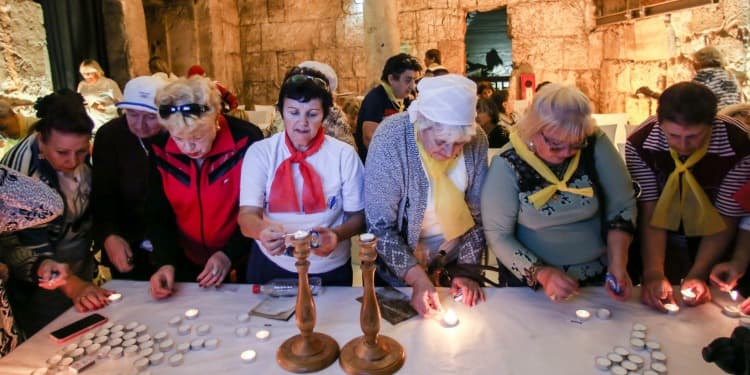Holocaust Survivors Finally Celebrate their Bar and Bat Mitzvahs
The Fellowship | November 14, 2017

The Holocaust not only robbed many Jews of their loved ones, but also their ability to worship God. This is why The Fellowship held bar and bat mitzvah celebrations today for 45 Holocaust survivors, allowing them to attend this special Jewish coming of age celebration more than 70 years after World War II ended.
Usually, Jews celebrate their coming of age, or bar mitzvah (for boys) and bat mitzvah (for girls), as children. These 45 survivors reached bar or bat mitzvah age during the war or immediately afterwards, so they never got to participate in the ceremony marking a Jewish boy’s or girl’s entrance to adulthood. Alexander Buchnik, one of the participants in today’s event, said: “All my life, I felt that I missed it so much. I am so excited and happy.”
The day was packed with joy, gratitude, and praise to God. First, Yael Eckstein greeted the participants at the Western Wall, one of the holiest sites of Judaism. As the elderly arrived, they were divided into two groups. One group toured the Western Wall Tunnels, where they explored the underground passages hidden from view. The second group toured the Chain of Generations Center, which includes eight subterranean halls containing works of glass art that display Jewish history.
After the tours were completed, the women attended their bat mitzvah ceremonies, where they lit candles and said prayers for family members who had been murdered during the Holocaust, as well as prayers for their children and grandchildren.
The men attended their bar mitzvah ceremonies, where they put on tefillin – or “phylacteries,” a set of small black leather boxes containing scrolls of parchment inscribed with verses from the Torah. After their bar mitzvah, boys are obligated to wear tefillin every day during morning prayers (except on Shabbat and festivals) for the rest of their lives.
Jewish tradition tells us that bar and bat mitzvah ceremonies serve as the moment when children become accountable for their actions. A boy becomes a bar mitzvah, meaning “son of the commandments,” at the age of 13; a girl becomes a bat mitzvah, or “daughter of the commandments,” at age 12. This is when the child assumes the responsibility for their moral and religious behavior, as well as the other privileges that come with being a Jew.
Even though these survivors are celebrating a little late, they were so happy just to be celebrating at all. Now elderly, many of the survivors said they’ve long felt that because they’d never had a bar or bat mitzvah, something was missing from their Jewish identities. Aspir Ravicher was 11 when the war began. Her family fled from their homes in Ukraine to Russia. Throughout the war, they lived on the run, focused solely on the need to survive each day.
“We ran away with nothing but the clothes we had on us. We had nothing, we were hungry all the time, we lived in a crowded place – I remember that it was mostly cold and I was very hungry,” Ravicher recalled. A bat mitzvah “was not something we could have done.”
After the ceremonies, the entire group gathered and sang HaTikvah, the national anthem of Israel, in the Western Wall Plaza. Then they had a festive meal followed by traditional Israeli dancing.
It was a joy to see these survivors finally get to celebrate something that every Jew should experience. During the dinner and dancing, the survivors found their inner child. They danced with the energy of 12-year-old bat mitzvah girls and 13-year-old bar mitzvah boys.
All the participants had a lovely night.
Rabbi Yechiel Eckstein, said: “I find it difficult to think of anything more inspiring than elderly Holocaust survivors who receive a late bar and bat mitzvah celebration in the holiest place for the Jewish people, after surviving the terror of the Nazis and having their childhood stolen from them.”
The Fellowship supports 20,000 Holocaust survivors annually throughout Israel, including 18 of those from our With Dignity and Fellowship program who participated in today’s event. The Fellowship provides low-income survivors with food, dental care, emergency medical services, and companionship care for the lonely.
“These survivors are heroes,” Rabbi Eckstein said of today’s group. “I am so grateful to be part of this momentous experience for them. We help them throughout the year, and I welcome the opportunity to be part of this exciting event.”
Learn how you can help support impoverished elderly people and others in need in Israel.
